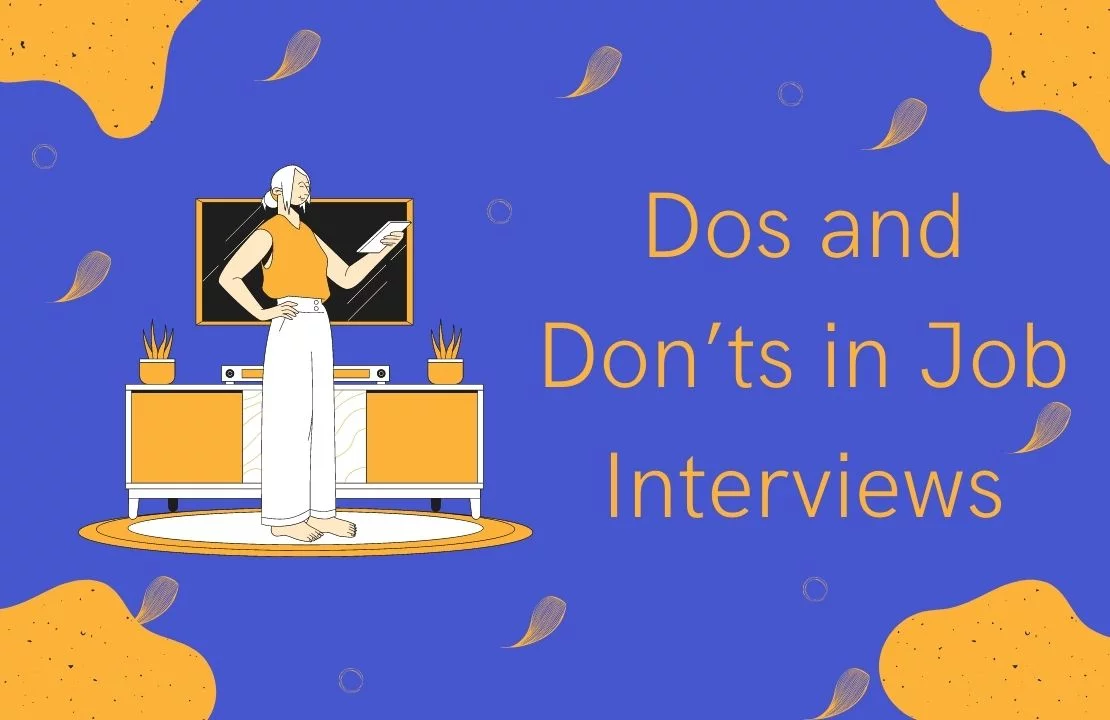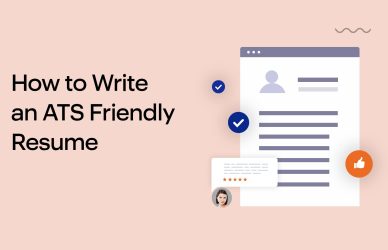Interview Tips:
Here are ten commonly asked interview questions along with suggested answers:
1. Tell me about yourself.
Answer: “I am a recent graduate with a degree in [Your Major]. During my time at [Your University], I focused on [Key Achievements or Relevant Courses]. I am passionate about [Your Industry/Field], and I am excited to bring my skills in [Key Skill] to contribute to [Company/Organization].”
2. What are your strengths and weaknesses?
Answer: “One of my strengths is [Specific Skill or Trait], which I have honed through [Relevant Experience]. As for weaknesses, I have been working on improving my [Area of Improvement], and I have taken steps such as [Action Taken] to enhance this aspect.”
3. Why do you want to work for our company?
Answer: “I have been following your company for a while and am impressed by your commitment to [Company Values or Achievements]. I believe my skills in [Your Skills] align well with the goals of the company, and I am eager to contribute to the success of [Company Name].”
4. Can you describe a challenging situation you faced at work/school and how you dealt with it?
Answer: “During my internship at [Previous Company], I encountered a challenge when [Describe the Situation]. I took a proactive approach by [Actions Taken], which resulted in [Positive Outcome]. This experience taught me the importance of [Lesson Learned].”
5. Where do you see yourself in five years?
Answer: “In five years, I envision myself in a role where I have further developed my skills in [Your Field] and have taken on additional responsibilities. I am committed to ongoing learning and contributing to the success of the team and the organization.”
6. What do you know about our industry/company?
Answer: “I have conducted extensive research on your industry and your company. I am aware that your company is a leader in [Specific Industry/Market], and your recent achievements, such as [Highlight Recent Achievement], demonstrate your commitment to excellence.”
7. How do you handle stress and pressure?
Answer: “I thrive under pressure by staying organized and focused on priorities. During stressful situations, I prioritize tasks, communicate effectively with my team, and break down complex problems into manageable steps. I also make sure to take short breaks to maintain my focus and mental well-being.”
8. Tell me about a time you worked in a team.
Answer: “In my [Relevant Experience], I collaborated with a diverse team to [Describe Project or Task]. I took on the role of [Your Role], ensuring effective communication and cooperation among team members. Through our collective efforts, we successfully [Outcome or Achievement].”
9. What skills do you bring to the table that will benefit our company?
Answer: “I bring strong [Key Skill] skills, developed through [Relevant Experience or Education]. Additionally, my proficiency in [Another Key Skill] and my ability to [Specific Strength] make me confident in my ability to contribute to the success of your team.”
10. Do you have any questions for us?
Answer: “Yes, I do. Can you tell me more about the team dynamics and the collaborative environment within the company? Additionally, what opportunities are there for professional development and growth within the organization?”
Remember to customize your responses based on your own experiences and the specific job you are interviewing for. Practice these answers to feel more confident and articulate during your interview.
Q.1) Sell this water bottle to me?
My Answer:
(Who the hell pitches to sell water bottle :-P, It was a normal water bottle and after some thought, I decided to answer this question hypothetically and show some creativity)
I: Hello sir, do you have a minute, can I talk to you? (That’s the standard way of how to approach a prospective customer:-P)
Interviewer: yes, of course
I: So, sir, what is your daily routine?
Interviewer: Well I go to office, 10 to 6 , then I come home and relax..(How’s that relevant to water bottle, huh?)
I: So, you are constantly at work in office. (I know the answer :-P)
Interviewer: yes. (anyone here to say No?..:-P)
I: You know that doctors recommend to drink water every half an hour, do you?
Interviewer: hmm, yes, I know, but I hardly do (what is he up to?)
I: No worries, I got a bottle with a creative opener that has a flag attached to it which will pop up every half an hour reminding you to drink water, sounds interesting? (Fingers crossed…)

Interviewer: Next Question… (Just a small smile, how rude?)
Here are some tips and guidance for your career and job search If you’re a student in the last year of graduation.
Self-assessment:
Reflect on your skills, interests, and values. Identify your strengths and areas for improvement. Consider your long-term goals and how they align with your chosen field of study.
Networking:
Attend career fairs, seminars, and networking events to connect with professionals in your field. Utilize online platforms like LinkedIn to build a professional network.
Internships:
Seek internships in your field to gain practical experience and enhance your resume. Internships also provide an opportunity to explore your interests and make valuable industry connections.
Resume Building:
Craft a well-organized and tailored resume that highlights your skills, education, and any relevant experiences. Emphasize any projects, internships, or coursework that demonstrate your practical knowledge.
Online Presence:
Develop a professional LinkedIn profile with a clear and concise summary, showcasing your skills and experiences. Clean up your social media profiles, as employers often check them.
Skill Development:
Identify any gaps in your skills and take steps to fill them. Consider online courses, workshops, or certifications. Stay updated on industry trends and technological advancements in your field.
Job Search Strategies:
Use online job portals like Naukri, Indeed, and LinkedIn to search for job opportunities. Leverage the placement cell or career services at your college for job leads and guidance.
Interview Preparation:
Research common interview questions in your industry and practice your responses. Prepare questions to ask the interviewer to demonstrate your interest in the company.
Professional Development:
Join industry-specific groups and forums to stay informed about job openings and trends. Consider joining professional organizations related to your field.
Stay Persistent:
The job search process can take time. Stay persistent, be open to learning, and be flexible in your approach. Don’t be discouraged by rejection; use it as an opportunity to learn and improve.
Remember that the Indian job market is dynamic, and networking is a crucial part of the process. Connect with alumni, professors, and professionals in your field to gain insights and advice specific to the Indian job environment. Good luck with your job search!
When applying for jobs, there are several dos and don’ts to keep in mind to increase your chances of success. Here’s a list to guide you:
Dos:
Customize your resume:
Tailor your resume to match the specific requirements of each job application. Highlight relevant skills and experiences.
Write a compelling cover letter:
Craft a personalized cover letter that expresses your genuine interest in the position and company. Address how your skills align with the job requirements.
Research the company:
Familiarize yourself with the company’s values, culture, and recent achievements. Reference this information in your application and interviews to demonstrate your interest.
Use professional language:
Maintain a professional tone in your resume, cover letter, and any communication with potential employers. Avoid slang and informal language.
Follow application instructions:
Pay attention to the specific instructions provided in the job posting. Submit all required documents and information as requested.
Create a strong online presence:
Optimize your LinkedIn profile with a professional photo, comprehensive work history, and endorsements. Ensure other social media profiles present you in a positive light.
Network:
Connect with professionals in your industry through networking events, LinkedIn, and other platforms. Networking can lead to valuable job opportunities.
Prepare for interviews:
Research common interview questions and practice your responses. Be ready to discuss your experiences, skills, and how they align with the job.
Follow up after interviews:
Send a thank-you email expressing your gratitude for the interview. Reiterate your interest in the position and briefly mention why you believe you are a good fit.
Be honest:
Provide accurate information in your application. Be truthful about your skills, experiences, and qualifications.
Don’ts:
Use a generic resume:
Avoid sending the same resume for every job application. Tailor your resume to emphasize the most relevant skills and experiences for each position.
Submit a generic cover letter:
Write a unique cover letter for each application. Avoid using a generic template that doesn’t address the specific requirements of the job.
Neglect spelling and grammar:
Proofread your resume, cover letter, and any other written communication. Spelling and grammar errors can create a negative impression.
Apply to every job:
Focus on quality over quantity. Apply for positions that align with your skills and interests rather than applying indiscriminately.
Badmouth previous employers:
Avoid speaking negatively about previous employers or colleagues. Maintain a positive and professional tone in all communications.
Neglect online presence:
Ensure that your online presence is professional. Remove or update any content that could be seen as unprofessional by potential employers.
Forget to follow up:
After an interview, follow up with a thank-you email within 24-48 hours. This reinforces your interest in the position and shows good manners.
Be unprepared for interviews:
Research the company and prepare answers to common interview questions. Being unprepared can make you appear disinterested in the position.
Lie on your resume:
Never provide false information on your resume or during interviews. It can lead to serious consequences and damage your professional reputation.
Wait too long to apply:
Apply promptly when you find a job opening that matches your skills and interests. Waiting too long may result in the position being filled.
By following these dos and don’ts, you’ll present yourself as a strong and professional candidate in the job market. Tailoring your approach to each application and maintaining a positive online and offline presence are key to a successful job search.
General skills that are increasingly valuable in the current job market
The job market is dynamic, and the skills required by employers evolve to meet the demands of emerging industries and technologies.
Digital Literacy:
Proficiency in using digital tools, software, and online platforms is essential across various industries.
Data Analysis:
The ability to analyze and interpret data is valuable. Skills in data visualization, statistical analysis, and using tools like Excel or more advanced analytics platforms are in demand.
Critical Thinking:
Employers seek individuals who can analyze situations, think critically, and make informed decisions.
Adaptability and Flexibility:
The capacity to adapt to change and embrace new technologies or methodologies is crucial in today’s fast-paced work environments.
Creativity:
Creative thinking is increasingly valued as it fosters innovation and problem-solving.
Communication Skills:
Effective communication, both verbal and written, is essential for collaboration and client interactions.
Collaboration and Teamwork:
The ability to work well in diverse teams and collaborate across departments or even globally is highly prized.
Emotional Intelligence:
Understanding and managing one’s own emotions and those of others is crucial for effective teamwork and leadership.
Cybersecurity Awareness:
With increasing cyber threats, basic knowledge of cybersecurity best practices is becoming essential in many roles.
Project Management:
Understanding project management methodologies and tools is valuable for overseeing tasks and meeting deadlines.
Remote Work Skills:
Given the rise of remote work, being comfortable with virtual collaboration tools and demonstrating self-discipline are important.
Customer Service Skills:
Strong customer service skills, whether dealing with external clients or internal stakeholders, are vital for many roles.
Cultural Competence:
An awareness and understanding of diverse cultures and the ability to work with people from various backgrounds are increasingly important in globalized workplaces.
Sales and Marketing Skills:
Basic sales and marketing skills are valuable across various roles, as individuals are often required to sell ideas or products.
Learning Agility:
The ability to quickly learn and adapt to new technologies, tools, or industries is a highly sought-after skill.
Robotics and Automation Skills:
Basic knowledge of robotics, automation, and artificial intelligence can be beneficial in various fields.
Health and Well-being:
Skills related to health and well-being, including stress management and work-life balance, are gaining importance as organizations focus on employee wellness.
Supply Chain Management:
Understanding supply chain processes and logistics is critical for roles in manufacturing, retail, and other related industries.
Continuous learning and staying updated with industry trends are crucial for remaining competitive in the job market. The specific skills required can vary based on industry, job role, and geographical location.
Importance of an ATS (Applicant Tracking System) resume is crucial in the modern job market for several reasons:
Automated Screening Process:
Many large and even mid-sized companies use ATS to manage the high volume of resumes they receive. An ATS helps automate the initial screening process, allowing recruiters to focus on the most qualified candidates.
Increased Visibility:
An ATS-friendly resume is more likely to be parsed accurately by the system. This increases the chances of your resume being selected for further review by recruiters or hiring managers.
Efficient Recruitment Process:
ATS streamlines the recruitment process by quickly identifying candidates who meet specific criteria. This allows recruiters to save time and resources by focusing on applicants whose skills and experiences align with the job requirements.
Alignment with Job Descriptions:
ATS resumes are optimized with keywords relevant to the job description. When your resume includes the right keywords, the ATS is more likely to recognize your application as a good match for the position.
Adaptation to Technology:
In the digital age, technology plays a significant role in recruitment. An ATS-friendly resume demonstrates your ability to adapt to modern hiring processes, showcasing your awareness of current industry practices.
Broader Job Opportunities:
Many job postings are exclusively available online, and an ATS is often the first point of contact between you and the employer. Having a resume optimized for ATS increases your chances of being considered for a wide range of job opportunities.
Competitive Advantage:
In a competitive job market, an ATS-friendly resume can give you a competitive advantage. It ensures that your application is processed efficiently, making you stand out among other candidates.
Improved Job Matching:
ATS technology not only helps recruiters but also benefits candidates. By matching your skills and experiences with specific job requirements, the ATS ensures that you are considered for roles that align with your qualifications.
Increased Visibility for Entry-Level Positions:
Entry-level positions, internships, and graduate programs often receive a high volume of applications. An ATS resume helps you navigate the initial screening process, increasing your chances of being noticed by recruiters.
Time Efficiency:
An ATS-friendly resume reduces the likelihood of technical issues or misinterpretation of your application. This can save you time and frustration during the job application process.
In summary, having an ATS-friendly resume is essential in the contemporary job market. It not only increases the likelihood of your application being seen by human recruiters but also demonstrates your awareness of and adaptation to modern hiring practices.
Winning and achieving success in a competitive job market requires a combination of strategic planning, continuous learning, effective networking, and a proactive mindset. Here are some tips to help you succeed in the competitive job market:
Define Your Goals:
Clearly define your short-term and long-term career goals. Knowing where you want to go will guide your actions and decisions.
Continuous Learning:
Stay updated on industry trends, advancements, and required skills. Invest time in acquiring new skills and certifications relevant to your field.
Build a Strong Online Presence:
Create a professional LinkedIn profile that showcases your skills, experiences, and achievements. Engage in industry discussions and connect with professionals in your field.
Optimize Your Resume:
Tailor your resume for each job application. Highlight specific achievements, skills, and experiences that align with the requirements of the position.
Network Effectively:
Attend industry events, seminars, and networking functions. Build relationships with professionals in your field, both online and offline.
Utilize Professional Organizations:
Join professional organizations related to your industry. Attend events, participate in forums, and take advantage of resources they offer.
Showcase Your Achievements:
During interviews, emphasize your achievements and the impact you’ve made in previous roles. Provide quantifiable results whenever possible.
Demonstrate Adaptability:
Showcase your ability to adapt to change and learn quickly. Highlight instances where you successfully navigated challenges or acquired new skills.
Develop Emotional Intelligence:
Cultivate emotional intelligence to effectively navigate workplace relationships, collaborate with others, and demonstrate resilience in the face of challenges.
Stay Positive and Persistent:
Job searches can be challenging, and rejection is a part of the process. Stay positive, learn from setbacks, and persist in your efforts.
Research Companies Thoroughly:
Before interviews, thoroughly research the companies you’re applying to. Understand their values, culture, and recent achievements. This knowledge will help you tailor your responses and demonstrate your genuine interest.
Create a Professional Brand:
Develop a personal brand that reflects your skills, values, and unique qualities. Consistently communicate this brand through your resume, online profiles, and interactions.
Be Proactive:
Actively seek out opportunities, whether they are job openings, networking events, or chances for professional development. Proactivity sets you apart from other candidates.
Develop a Strong Work Ethic:
Demonstrate a strong work ethic through your past experiences. Highlight instances where you went above and beyond to deliver results.
Seek Feedback:
Be open to feedback and constructive criticism. Use it as an opportunity for growth and improvement.
Cultivate Soft Skills:
Develop and showcase soft skills such as communication, collaboration, and problem-solving. These skills are highly valued in most workplace environments.
Understand Industry Trends:
Stay informed about the latest trends, technologies, and developments in your industry. This knowledge positions you as someone who is forward-thinking and engaged.
Build a Diverse Skill Set:
Cultivate a diverse skill set that includes both technical and soft skills. The ability to adapt to a variety of tasks and responsibilities enhances your marketability.
Remember that success in a competitive job market often involves a combination of skills, strategies, and a positive attitude. Stay focused on your goals, continually improve yourself, and be persistent in your pursuit of success.




